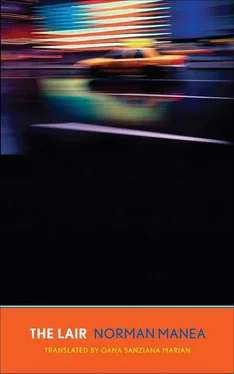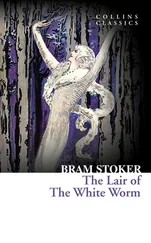“Dima hadn’t spoken to Palade about his former comrades, and he couldn’t attack his Communist adversaries. He was in their hands, they could at any point pull out the old documents from the archives … The good Granny hears and sees and says nothing, Palade would say, just like you. The Old Man responded to any difficult question by cracking his boney knuckles and taking up the knitting of his little hat, that’s what your friend Palade, the unrequited lover, would say.”
Days and nights of controversy. Gora anticipated a harsh review. Would Peter Ga  par verbalize his hesitations, or the rhetoric of justice?
par verbalize his hesitations, or the rhetoric of justice?
And what if it’s an admirable text, muttered Gora to himself. It would revive the rumors that had circulated after Peter published Mynheer, when people began to regard him as the author of who knew what masterpiece. That’s all we need!
That’s all we need, not just a poor story or a poor review, but a masterpiece, babbled Gora to himself, assaulted by another attack of Peter’s loquaciousness.
“Should I write in the name of truth, or memory? Do you have any other cliches to offer me?”
Gora held his head in his palms and scrutinized the matte surface of the table, on which the yellow folder entitled RA 0298 was left visible and open.
He didn’t want to listen and couldn’t escape the voice of the phantom. He already knew the variations in the score.
“The Maestro refuses to judge himself, but what about us? What do we know about the Old Man? That he wrote some idiotic articles, after he was enraptured by the vitality and piousness of idiots determined to change the world. Why should that interest me? Because those idiots gassed a sister of mine or because I wouldn’t have been born if she hadn’t died first?”
Ach, Peter’s long lamentations! The listener felt that something was slipping past him in this interrogative fervor.
“I know, I should have written it,” babbled Professor Gora, gripping his head with his hands; he wanted to smash it, to release the worms from his gelatinous brain. “I couldn’t do it! Dima showed me some of his highly improbable generosity, you can be sure. Nor could I harm his wife, that innocent Englishwoman; Merrie would have been devastated if my name were to appear with that review. Yes, Dima is guilty; even Palade confirmed it. He would have been forgiven if he’d asked for forgiveness, I agree with you. Was it a definitive, ideological guilt, a lapse in intelligence? Indirect evil, yes, he could have asked to be forgiven for that, too. But he believed himself to be brilliant, it didn’t matter if he admitted his guilt or asked for amnesty, for his sins to be forgotten. But to ask forgiveness, he’d have had to believe in something. And he only believed in himself! In his supreme endowment, his supreme eminence. The genius, comparable only with other geniuses, but incomparable! Intangible, generous, above everything, in the ether. It would have meant to ask forgiveness of himself. The drunkenness of vanity. The amoral, above the profane! In the stratosphere of the occult, in the illusory Olympic realms.”
“So was he an idiot, a child, an affable monster? That would all be fine, but why also militant?”
This time, Professor Gora sighed, tired of Peter’s wailings.
“Why do I feel pity for him?” cried the newly exiled. “Pity, pure and simple! He lived his life among books and produced books. The idiot, that’s what he believed was essential. It was the game of an aged child. Posterity, immortality, all of that nonsense. I wonder what he felt when his library burned? As if he himself were burning, piece by piece, book by book. The books, arranged so carefully, for Judgment Day. Yes, I’m sorry for him. The idiot that I am is sympathetic and will write sympathetically about your and Palade’s idiot.”
The ghostly guest stopped, but not really. Gora was listening to him but heard himself.
“Was the Utopian joke innocent? Was he getting bored in his lonely cell? Was he tired of isolation, of the futility of words? Was he vitalized by the staging of the vitalists who sing, convert, and kill in the name of God, dreaming of Death’s embrace? And why should I, specifically, understand that? The cannibal beast is waiting for me, too, in the corner of the room, unseen. Cancer, stroke, at your command, ladies and gentlemen. The stateless exile found his revenge, that’s what they’ll say … He wrote the indictment in the blood of the sister that was never to be his sister. That’s what both my detractors and defenders will say.”
He was panting, poor Peter, suffocating with the passion and joy of listening to himself.
“With the blood of his sister, no? Good publicity title. I’m not a magistrate, Professor, I’m not writing in anyone’s name, not even to avenge those who deserve much more than vengeance. Don’t worry, Professor, I’ll be moderate, and careful. I’m a former relative of yours, isn’t that right? By association, of course, by alliance, semi-alliance, discrepancy. Relation by alliance … what kind of alliances can exist between us? Are you afraid, maybe, that I might compromise your position? Don’t worry. The obituary must be honest; it’s enough that the life was protected by lies.”
The word obituary had been uttered with a well-disposed sarcasm. Peter Ga  par seemed to intuit more than he knew and to know more than he let on about the obituary dedicated, by Gora, to Maestro Dima.
par seemed to intuit more than he knew and to know more than he let on about the obituary dedicated, by Gora, to Maestro Dima.
Gora was gripping his head in his hands once more. “You don’t even know the whole story, my boy. You haven’t heard of Marga Stern, the love of the scholar’s youth. During the war, the Maestro lived in a neutral country, where rumors and spies intersected. He had access to newspapers and information. He knew about the horrors being committed by the Germans and their acolytes, but he was working, day and night, on his Magnum Opus. The shaking brothels allowed him to forget that Germany was losing and that the world was falling into the hands of the Russian beasts and the idiots in the West.”
The phantom continued to yell while Gora continued his own mute monologue. Neither heard the other anymore.
“I read his private journals. I understood his duplicity, his loneliness, his drugs, his lectures, his fascination with death. His literary experiments and his political bedevilment. I also know about Marga Stern.”
A long pause, just like last time. Gora was groaning; Peter Ga  par had exhausted the evening’s discourse. Quietly, Peter had disappeared, while Gora continued his own lamentation, “You don’t know everything, my boy, you don’t know. Marga remained in her native country, and the Maestro forgot her name. He was taking a special substance, similar to morphine. A drug he’d gotten from German Nazi soldiers from the front.”
par had exhausted the evening’s discourse. Quietly, Peter had disappeared, while Gora continued his own lamentation, “You don’t know everything, my boy, you don’t know. Marga remained in her native country, and the Maestro forgot her name. He was taking a special substance, similar to morphine. A drug he’d gotten from German Nazi soldiers from the front.”
The pause had been a mere illusion, just as last time. A cheap trick for catching his breath and reclaiming his audience. Peter found his rhythm once again and his sonority, and Gora recovered his hearing.
The fury of the phantom gradually covered a whole world, but the world it covered was incomplete.
“Nonsense! The Party editorials that comrade prosecutor Ga  par, my loyal father, used to read us in the evenings, at the table, weren’t any better; they were merely promoting opposing cliches. On the one hand, there was the Party of comrade Ga
par, my loyal father, used to read us in the evenings, at the table, weren’t any better; they were merely promoting opposing cliches. On the one hand, there was the Party of comrade Ga  par, and Dima’s saintly bodyguards, on the other! Sure, comrade Ga
par, and Dima’s saintly bodyguards, on the other! Sure, comrade Ga  par paid in advance, at Auschwitz, so he was entitled to error, to foolishness. Was he, I wonder? Did he have the right to believe in commissars who promised paradise?”
par paid in advance, at Auschwitz, so he was entitled to error, to foolishness. Was he, I wonder? Did he have the right to believe in commissars who promised paradise?”
Читать дальше

 par verbalize his hesitations, or the rhetoric of justice?
par verbalize his hesitations, or the rhetoric of justice?










